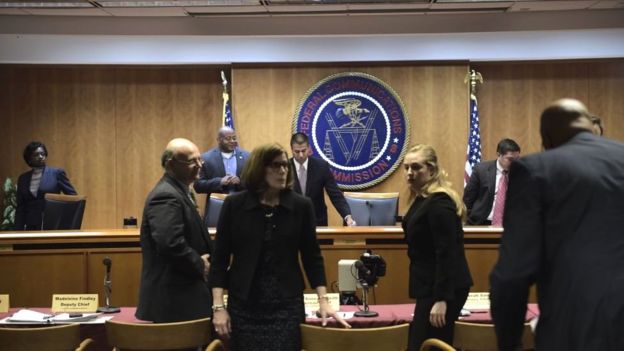Restrictions on US broadband providers' ability to prioritise one service's data over another are to be reduced after a vote by a regulator.
The Federal Communications Commission voted three to two to change the way "net neutrality" is governed.
Internet service providers (ISPs) will now be allowed to speed up or slow down different companies' data, and charge consumers according to the services they access.
But they must disclose such practices.
Ahead of the vote, protesters rallied outside the FCC's building to oppose the change.
Many argue the reversal of rules introduced under President Barack Obama will make the internet less open and accessible.
The decision is already facing legal challenges, with New York's attorney general, Eric Schneiderman, announcing he will lead a lawsuit challenging the FCC's decision.
Mr Schneiderman accused the watchdog of failing to investigate possible abuse of the public commenting process. He said as many as two million identities, some of dead New Yorkers, were used to post comments to the FCC website.
During the hearing, FCC commissioner Mr Michael O'Rielly hit back at those claims, saying staff had been able to determine and discard comments that were illegitimate.
Thursday's proceedings in Washington were halted for about 15 minutes after a security alert forced an evacuation of the FCC's chamber, the final twist in a bitter and at times vitriolic debate.

The FCC's chairman, Ajit Pai, argues the changes will foster innovation and encourage ISPs to invest in faster connections for people living in rural areas.
He refers to the change as "restoring internet freedom".
Technically, the vote was to reclassify broadband internet as an information service rather than telecommunications.
The consequence of this is that the FCC will no longer directly regulate ISPs.
Instead, jurisdiction will pass to another regulator, the Federal Trade Commission (FTC). Its key responsibility will be to check that the companies disclose if they block data, throttle it or offer to prioritise traffic, rather than stopping such behaviour.
One criticism of this is that US consumers often have few if any ISPs to choose between. Moreover, opponents of the change claim it could take years to address any misbehaviour.
"I dissent to this legally-lightweight, consumer-harming, corporate-enabling, destroying-internet freedom order," said Democrat commissioner Mignon Clyburn ahead of the vote.
But fellow commissioner Mr O'Rielly, a Republican, said fears over the end of net neutrality were a "scary bedtime story for the children of telecom geeks".
Latest Stories
-
Election 2024: This is not the outcome NPP hoped for – Stephen Ntim
7 minutes -
Ghanaian comedy shows held in 2024
6 hours -
Hohoe MP-elect vows to weaken NPP’s influence ahead of future elections
7 hours -
Women of Valour heads to Paris in 2025
7 hours -
Joseph Keys releases new single ‘Yonko Pa’
7 hours -
Human rights court declares New Nation School’s treatment of students as harsh
7 hours -
Polo Beach Club defies injunction on Dec. 22; noise concerns raised
8 hours -
I wish new leaders strength to rule Ghana – Akufo-Addo
8 hours -
Joseph Paintsil reflects on a stellar debut season with LA Galaxy
8 hours -
I urge security to take firm stance against post-election violence – Akufo-Addo
9 hours -
Akufo-Addo delivers Christmas message in final yuletide address to Ghanaians
9 hours -
Onion costs shoot up as traders lament scarcity of commodity
9 hours -
Registration for MPs-elect to begin on December 25
9 hours -
EC calls for stakeholders’ support to complete electoral processes
10 hours -
Ghana Shippers Authority addresses Tema port delays, assures of efforts to resolve challenges
10 hours
